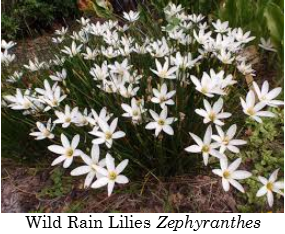A Record Warm Winter Creates Spring Challenges
Last month I said I wouldn’t start planting begonias just yet in spite of the spring-like temperatures, but this has certainly been the warmest winter in many years. We could have planted lots of warm weather plants in February but the likelihood of a March freeze still holds true for another 20 days, so let’s try to be a little patient!The recent rain was sorely needed, but weeds are now exploding onto the scene. Pre-emergent applications from the fall were only partially effective after being diluted with nearly 20 inches of rain in October – November. We are applying broadleaf control for plants like dandelion and henbit now and spot spraying for certain grassy weeds like wild rye. Remember though that most of these plants have begun flowering already and it takes at least 2 weeks and 2 applications to knock these weeds down. Our crews are busy cutting back roses, perennials, and grasses, and I hate to tell you but it is already time to fire up the mowers.
So here is our annual reminder: RESIDENTIAL CUSTOMERS! If you are not on a year-round contract, please call to let us know when you are ready for mowing or your spring clean up. We don’t want you to wonder where we are, but we also have some clients that like to wait until late in March to start.
And not to be the bearer of bad news, but with less than half of our normal freeze days this winter we can probably expect lots of insect issues and an early crop of mosquitoes and fire ant activity. We will try to keep you informed as we observe these problems, but let us know if you need our help. We offer mosquito fogging, fire ant control that is guaranteed all season, and treatments for other pests we will see this year, such as bagworms, tent caterpillars, and chinch bugs.
Ready or not, we are into an early spring so hang on for the ride!
No Fire Ants For The Season - Guaranteed!
Fire ants may be the most annoying pest of all. They do millions of dollars in damage each year to electrical equipment and agriculture, and swarm out when disturbed to inflict painful bites to children, pets, and any unsuspecting gardener.Fire ants can migrate miles when swarming and tunnel up to 20 feet deep, so permanent eradication is not possible. However, we can treat your entire property with a long residual product that will eliminate existing colonies and create a barrier to prevent new swarms from moving in. When done in March, we guarantee control for 8 months!
Prices start at just $155 for a full year. Call for your free quote today and get 10% off your first year!
Pond Season Starting Up
String algae season is starting early this year. As much as we love our beautiful water features, we pond owners hate string algae equally. Since aquatic plants have not come out of dormancy and cool water temperatures reduce the bacteria colonies in your filters and gravel, conditions are optimal for the growth of string algae. Algae is a natural, healthy organism in any natural water feature, but it can bloom suddenly in a matter of days and become unsightly.We start our annual clean outs this month, changing the water, washing down the gravel, removing the sludge, cleaning the filters, trimming and thinning out water plants, and changing the water to get your pond started on the right foot for spring.
Give Spencer a call to book your spot for your spring clean out!
Thank You For Your Business
 Spring is upon us in full force. We want to thank all our clients who started on their spring projects with us a month or two ago when we had a little more free time, and we appreciate the patience of all of you who are now calling in for landscape projects and having to wait for your estimate. We will do our best to get to whatever you need as quickly as we can.
Spring is upon us in full force. We want to thank all our clients who started on their spring projects with us a month or two ago when we had a little more free time, and we appreciate the patience of all of you who are now calling in for landscape projects and having to wait for your estimate. We will do our best to get to whatever you need as quickly as we can.We look forward to working with you in the coming season. And remember- email is a great way to communicate with us!
contactus@primelandscapeservices.com





